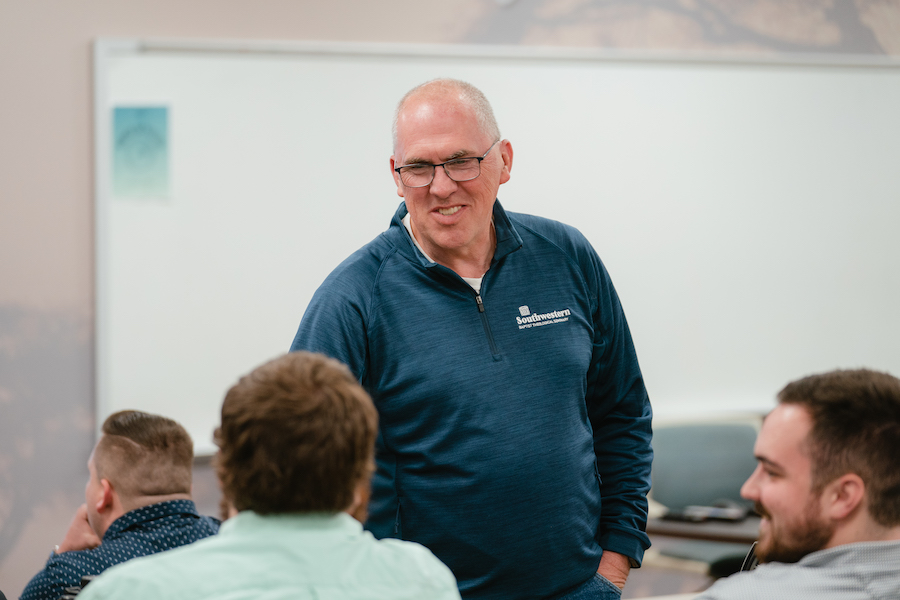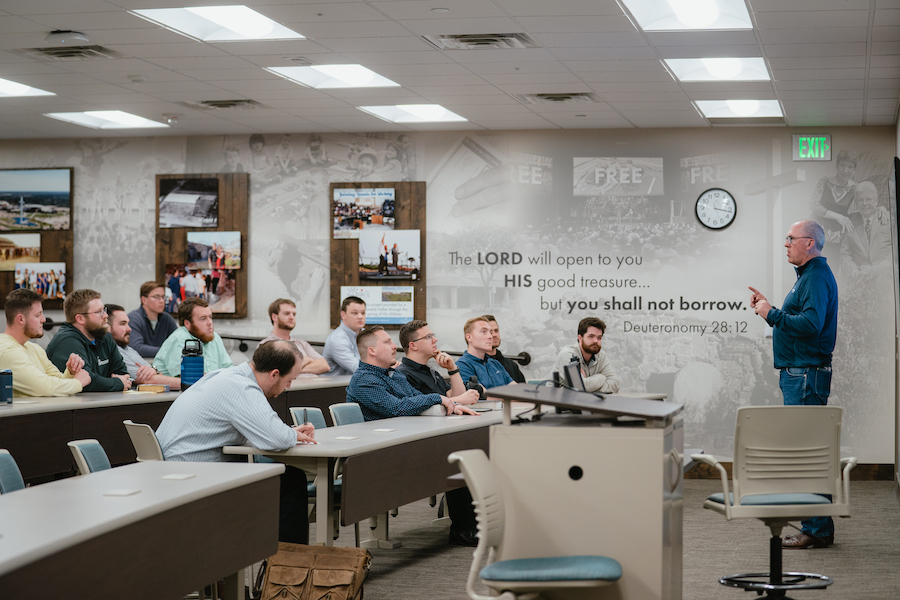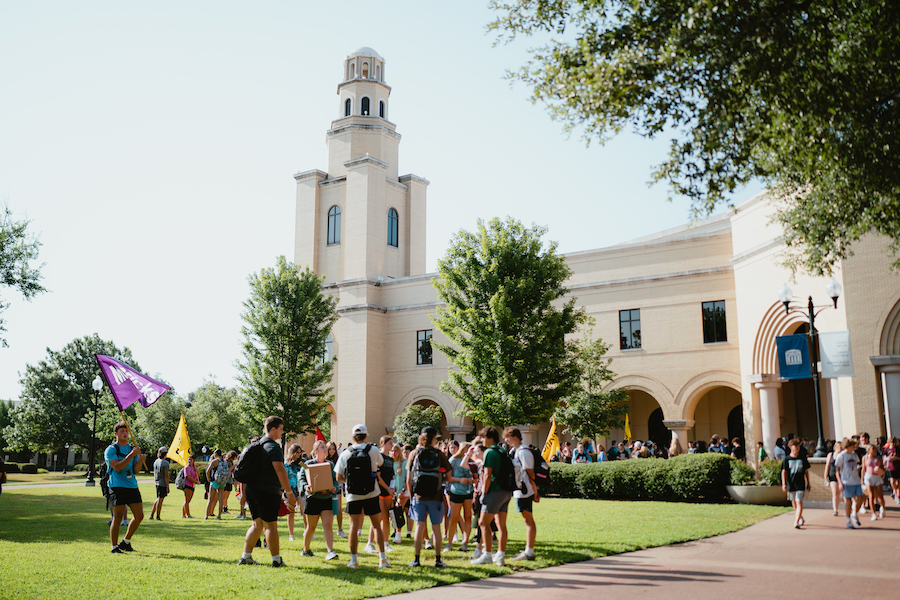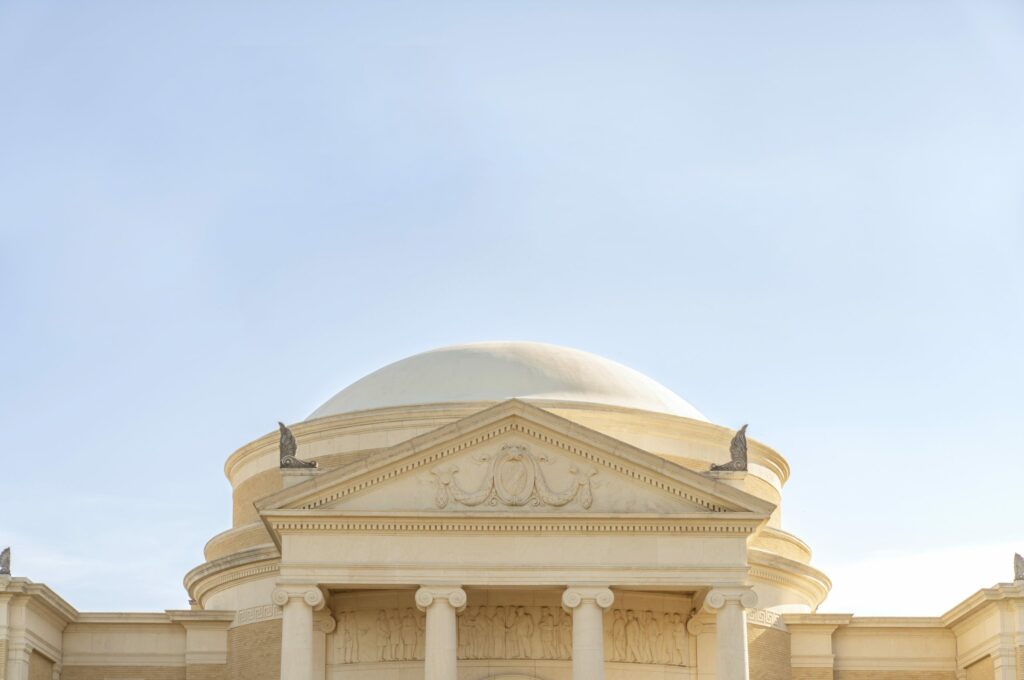Barber encourages aspiring, current pastors to be committed to cooperation

Drawing on more than 25 years of pastoral experience, Bart Barber, president of the Southern Baptist Convention (SBC), encouraged Southwestern Baptist Theological Seminary students who are aspiring and current pastors to work in cooperation with others during the Feb. 8 gathering of the Southwestern Society of Pastoral Ministry (SSPM).
“Cooperation in your local church consists largely of forcing you to care about other people’s ministries and not just your own,” said Barber, who is a two-time Southwestern Seminary alumnus and senior pastor of First Baptist Church in Farmersville, Texas. He added that this “is a very valuable and spiritually healthy thing that starts at cooperation in your local association.”
Barber said that working in cooperation within local associations and the state convention has “helped” him “develop a sense of camaraderie” with “a lot of people who have become really close friends of mine to this day.” He told a story of when he was studying at Southwestern while pastoring and met other pastors in his local association who became friends, including Mark McClellan, professor of missions and director of Hispanic Programs at Southwestern, and Hance Dilbeck, president and CEO of Guidestone Financial Resources.
Throughout the evening, Barber spoke about the benefits of working in cooperation with other SBC churches and entities, including Southwestern.
“Why is it that FBC Farmersville is doing great without me being there?” asked Barber, referencing his demanding schedule as SBC president. “Because we have hired excellently.”
Barber noted the individuals on his staff who are graduates or current students at Southwestern while advising the students at the meeting that “if you lead your church to be involved in cooperating, that can help you to recruit good talent for your church.”
Barber also spoke on the role of Southern Baptists in supporting those serving on the mission field because of cooperation. Using his knowledge and love for Baptist history, Barber spoke on the foundations of missions among Baptists, led by Adoniram Judson and Luther Rice, to encourage the young and aspiring pastors to continue the work.
Noting Baptists did not support missions financially before Judson and Rice, Barber reminded the young men that the “Southern Baptist Convention exists to make sure that never happens again.”

Southern Baptist Convention President Bart Barber shared with a group of Southwestern Baptist Theological Seminary students who are aspiring pastors or who are currently pastoring. Barber, a two-time Southwestern Seminary graduate, encouraged the students to seek cooperation, including with fellow pastors, local associations, and SBC entities.
In response to a question about the “biggest threat” to cooperation among Southern Baptists, Barber said “substantial threats” include the litigious nature of society, citing as an example lawsuits connected to the sexual abuse crisis. While expressing confidence that “God’s people” have the resources to “withstand some lawsuit judgments,” he said the reputational “toll” is “difficult.”
The larger threat to Southern Baptist cooperation, Barber said, is “our society is so much more trending toward isolation and anger right now,” which is also a problem within local congregations and in “Convention politics.” The problem of isolation and anger is magnified by cable news and social media, he said.
He said throughout their history, Southern Baptists have debated theological issues. “It’s not just that we have differences in theological opinions. It’s not just that we debate those things. It’s how easily people are cast as the villain,” Barber said.
Still, Barber said he is not “worried” about this threat because “I believe the Holy Spirit of God moves among the midst of His people in His churches, and I’ll bet on Him any day.”
Barber answered other questions from the group on topics such as what his prayer is for the future of the SBC and the importance of local church autonomy while remaining cooperative. He took time to respond to each question with serious answers, while also including humor.
In an interview, Barber expressed appreciation for the opportunity to address the gathering of Southwestern students meeting for its second time.
“Anytime Southwestern Seminary asks me to do something, I’m going to say, ‘yes,’ if I can at all,” Barber said. “As president of the SBC, it’s my job to love all six of our seminaries, but I think everybody knows that I’m in a long-term, monogamous relationship with Southwestern Baptist Theological Seminary,” adding that he “loves what these guys are doing to emphasize pastoral ministry – that hits close to my heart.”
He added that there is a “great tradition” of Southwestern to prepare men to “serve as pastors of established churches and to lead those churches well.” He said that he is “happy to contribute to some folks who appreciate that heritage and are trying to promote it.”
“It’s really fun,” said Conrad Mills, a Master of Divinity student from Dallas, Texas, and leader of the SSPM, regarding having Barber lead the group’s meeting. “Obviously, his position is notable and he is an alumnus of the school, but it just means a lot that a guy who’s a pastor and also president of the Convention would come serve us in this way.”
Mills added that “by the way” Barber “lives his life,” he shows the students “that as Southern Baptists we’re committed to the Great Commission and working together for the advancement of the Gospel.”
The SSPM is a monthly meeting of Southwestern students who either currently serve or have a desire to serve in pastoral ministry. Each month, a different speaker addresses the group to provide pastoral insight and speak on various aspects of pastoral ministry.



